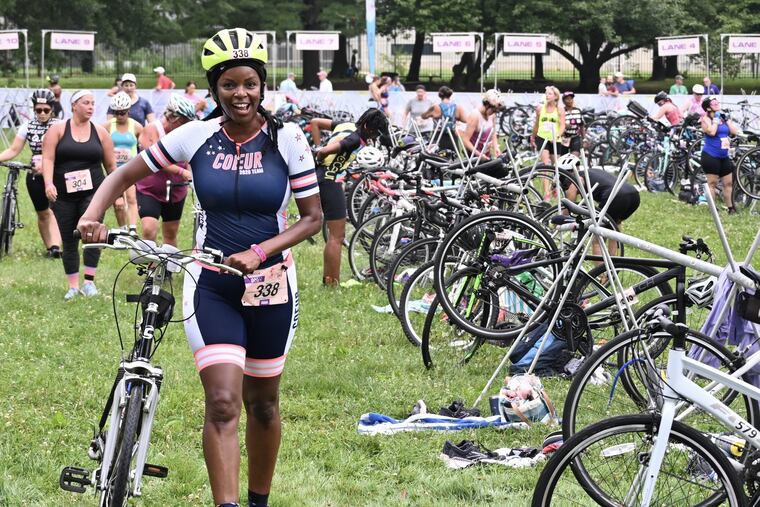Participating in a triathlon was on my bucket list, but then COVID happened | Jenice Armstrong
I mean, I can swim a little but I do not dive off of boats. Nope. No way. Same thing with jumping into the deep end of Olympic-sized swimming pools. I prefer easing my way in to maybe about 5 feet.

For years, I’ve wanted to scratch competing in a triathlon off of my bucket list.
I’ve participated in numerous Broad Street Runs, and half-marathons and two marathons. So taking on a multisport event is the logical next challenge, right?
But the mere thought of swimming in open water the way that some events require is scary. I can swim a little, but I do not dive off of boats. Nope. No way. Same thing with jumping into the deep end of Olympic-size swimming pools. I prefer easing my way into maybe about five feet of water. So, every year I tell myself, “I’ll sign up for a triathlon next year.” Do I do it, though? No.
But this spring, I was awarded a Power Up Triathlon training grant compliments of the Black Women in Sports Foundation, Coeur Sports, and USA Triathlon.
After the murder of George Floyd and resulting protests, Coeur officials decided to become proactive about diversifying and encouraging African American women to enter triathlons — and kudos to them. The U.S. Triathlon Association surveyed its members in 2020 and discovered that less than 1.5% were Black.
“We decided that we wanted to create a program that would get more women of color into the sport of triathlon,” said Lisa Holt, a Coeur ambassador.
I was thrilled but nervous.
Our event — the annual Philadelphia Women’s Triathlon in Fairmount Park — is considered a beginner’s race with its 400-yard pool swim, a 9-mile bike ride, and a 3.2-mile run. I felt confident about the run and ride. But the swim? Gulp.
Looking at these super-fit, competitive Ironman Triathlon and Half Ironman finishers on our Zoom calls made me wonder what I’d gotten myself into. Ironman events are the hardest one-day sport competitions in the world. Competitors swim 2.4 miles, ride 112 miles on a bicycle, and then run 26.2 miles.
Although I took swim lessons at a YMCA as a child and a few classes as an adult, I’ve never become fully comfortable in the water, which bothers me. According to USA Swimming, an estimated 70% of African Americans don’t know how to swim, for a variety of reasons, including lack of access to pools. I had no excuse, though. Before my gym closed during the early stages of the pandemic, I’d had access to three pools that I hardly ever used.
As I was bracing to tackle one of my biggest fears, we learned that organizers had eliminated the swim portion of the triathlon because of social distancing concerns and converted the event into a duathlon. Participants would run a mile, bike 9 miles, and then run an additional 3.2 miles.
» READ MORE: Here are the city pools that will be opening in Philly this summer
I breathed a sigh of relief. I wouldn’t have to worry about fitting all of my hair into a swim cap. Nor would I have to figure out how to add in swim sessions, in addition to biking and running.
Race day was July 11. It was hot and humid, so I took my time and enjoyed the smooth ride over the new asphalt paving on Martin Luther King Jr. Drive and the scenic park views. I didn’t win. But I didn’t come in last, either. I felt good about finishing my first duathlon. I got a lot out of the experience. And it wasn’t just me. Two other Black women also got grants to participate — one a stay-at-home mom with four children who lives in South Philly and the other a financial underwriter from Brewerytown.
“As a mother raising not just Black sons but a Black daughter, I want her to know that you can step into any of these spaces and do it because you chose to do it,” said Rudeisa Sutton, 34. “That’s why I do these things and I include my children. They knew every day that I was training. They’re never going to question what their abilities are.”
After the competition, I glanced in the direction of the Kelly Pool, which was closed and empty. I thought of all the kids who should have been in it learning their strokes so they didn’t end up a marginal swimmer as an adult like me and a whole lot of other folks. I told myself, “I’m going to work on my swimming and I’ll be back for next year’s triathlon.”
I have a year to get it together.
.